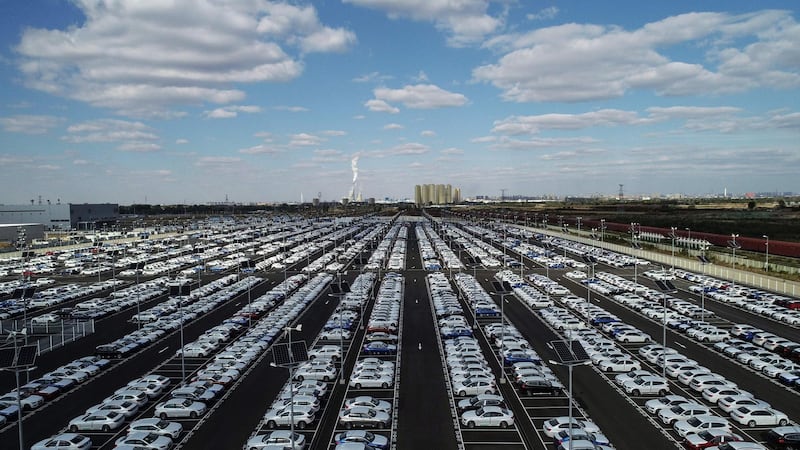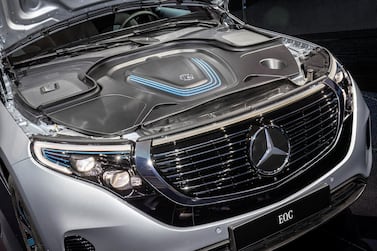When China responded to President Donald Trump’s trade war with an extra 25 per cent tariff on US-made cars in mid-2018, the move cut the number of vehicles exported from America by half.
China dropped the added levies for most of 2019 but is now threatening to bring them back as part of its latest escalation of the tit-for-tat with Mr Trump. While American car makers Ford and Tesla would suffer, a bigger blow would be felt by German companies that build Mercedes-Benz and BMW 4x4s at plants in Alabama and South Carolina.
“This puts the industry in a very difficult position,” said Alan Baum, an independent auto analyst in West Bloomfield, Michigan. “This could prompt a reaction from the US, which could mean more tariffs on parts from China. It makes it difficult for automakers to plan on where to invest.”
After the market closed on Friday, Mr Trump tweeted out his response. He said he will raise tariffs already in effect on $250 billion (Dh918.12bn) of Chinese imports to 30 per cent from 25 per cent on October 1 and tax the remaining $300bn in imports at 15 per cent instead of 10 per cent starting September 1.
Together, BMW and Daimler sold six of the 10 most popular US vehicles exported to China during 2018. The trade war cost BMW €300 million (Dh1.22bn) in 2018, and Mercedes parent Daimler was the first major global corporation to cut profit targets because of trade last year. Yet even companies such as General Motors that produce locally most of the cars they sell in China could be hit by levies on car parts and further retaliation measures.
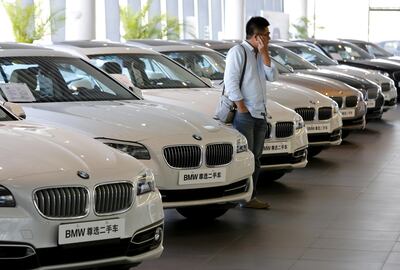
Shares of BMW fell 3.2 per cent to the lowest level in almost seven years on Friday, while Daimler declined 3.1 per cent. Tesla, the most exposed US manufacturer, slumped 4.8 per cent in New York, and GM and Ford also dropped.
While uncertainty about trade barriers - including potential US levies on imports from the European Union like high-margin Porsches - has eaten into car maker valuations, the companies have had almost two years to adjust to the new reality.
Here’s a rundown on their exposure to the new tariffs and what they’re doing to mitigate the impact.
BMW in 2018 calculated a full year of tariffs between the US and China would cost it about €600m, though the countries came to an agreement shortly before that scenario was realised. The company makes its entry-level X1 4x4 locally through a joint venture with Brilliance China Automotive and has plans to increase its ownership to 75 per cent by 2022.
The Munich-based car maker also moved local production of its X3 4x4 to China in May 2018, around the time the first round of retaliatory Chinese tariffs kicked in. Its best seller, the X5, is shipped in ready-to-assemble kits to Thailand before continuing on to China, avoiding any new penalties on US imports. Most exposed is the Spartanburg-made X7, BMW’s largest, which has sold well in China.
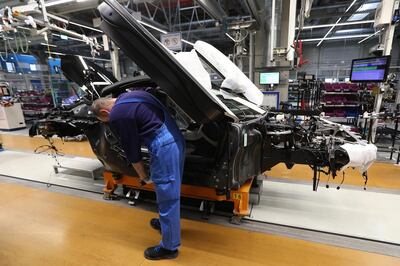
Between 5 per cent and 10 per cent of group earnings would be wiped out over a full year, Juergen Pieper, an analyst at Bankhaus Metzler, said in an email. “A second-half recovery would be difficult to achieve.”
Mercedes-Benz, meanwhile, never quantified the earnings impact of the trade war and has faced a range of other problems, including a regulatory crackdown on its diesel cars in Europe and production disruption affecting its popular GLE 4x4. It has said additional tariffs may prompt it to consider assembling some 4x4s in South East Asia, as BMW does with the X5, for export into China.
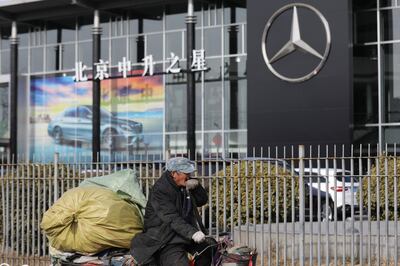
The car maker will start local production of its first all-electric 4x4, dubbed EQC, in China at the end of this year.
Tesla exports its pricey Model S saloon and Model X 4x4 to China, along with the lower-priced Model 3. About 14 per cent of its global output in the first half was sold there, according to Credit Suisse analyst Dan Levy.
Chief executive Elon Musk has high hopes for the Model 3 in China and has been focused on getting the company’s plant in Shanghai running by the end of this year. The Chinese tariffs are due to take effect in December, so the impact will depend on how quickly the plant starts production.
Tesla last week agreed to buy batteries from South Korea’s LG Chem to be used in electric vehicles produced in China, according to sources.
Batteries made by LG Chem will be used initially in Model 3 cars manufactured in the plant near Shanghai, Tesla’s first outside of the US said the sources. LG Chem batteries will also be used in Model Ys produced there once the car is released, they said.
The supply agreement isn’t exclusive to LG Chem, meaning Tesla could procure batteries from other suppliers as the Model 3 maker prepares to start production in China later this year, part of the EV pioneer’s push into what is the world’s biggest market for new-energy vehicles.
Ford expects China to become Lincoln’s biggest market, surpassing the US over next few years. Almost 10 per cent of its sales in China were imported, the vast bulk of them from the US - including top sellers such as the Mustang sports car and F-150 Raptor pickup truck. Three quarters of Ford’s exports to China are Lincoln models, and while all are now made in North America, local production of the Corsair small 4x4 will begin late this year.
“We encourage the US and China to find a near-term resolution on remaining issues through continued negotiations. It is essential for these two important economies to work together to advance balanced and fair trade,” the company said on Friday after the new tariffs were announced.
Avoiding levies is a key reason Lincoln plans eventually to build all its models in China, except for the Navigator 4x4, which doesn’t sell in large enough numbers. “We see China as ground zero for Lincoln, given the size of the market and how well the brand has been received,” Bob Shanks, Ford’s then-chief financial officer, said in May.
Fellow US car maker GM would have little exposure to the new tariffs. GM does send some American-made parts to China, but the impact is minimal, according to Levy, the Credit Suisse analyst.
The bigger risk to GM and companies with few exports to China is that there could be greater retaliation against their operations in China, or the Trump administration could add tariffs on parts made in China for US vehicles, said Mr Baum.
